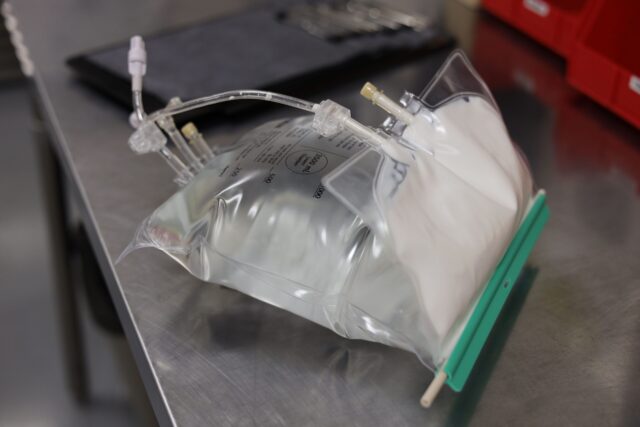STAYING HYDRATED WITH SHORT BOWEL SYNDROME (SBS) & PARENTERAL NUTRITION
NOTE: Nothing in this article is intended to convey medical advice.
Summertime requires us all to pay extra attention to staying hydrated, especially for short bowel syndrome patients, and certainly for patients living with home parenteral nutrition (HPN). Staying hydrated can be especially difficult for those with short bowel syndrome because they struggle with poor absorption of nutrients in the gastrointestinal tract.
Additionally, patients living with HPN have such difficulty absorbing nutrients that they require intravenous dietetic support, delivered daily through a catheter in their chest. It is especially important for HPN patients living with short bowel syndrome to actively manage their hydration.
 The main cause of Short Bowel Syndrome is surgery to remove part of the intestines due to disease, injury, or birth defect. Diseases common to Short Bowel Syndrome include various types of cancer, Crohn’s disease, intestinal dysmotility, midgut volvulus, or injury to the intestines through trauma.
The main cause of Short Bowel Syndrome is surgery to remove part of the intestines due to disease, injury, or birth defect. Diseases common to Short Bowel Syndrome include various types of cancer, Crohn’s disease, intestinal dysmotility, midgut volvulus, or injury to the intestines through trauma.
In warmer months, it is important to look at what short bowel syndrome patients can do to stay hydrated. Thankfully, an oral rehydration solution (ORS) can be used to replenish fluids.
What is an Oral Rehydration Solution (ORS)?
An ORS is a drink that is low in sugar, contains sodium, and sometimes contains potassium and bicarbonate. This unique chemistry allows the fluids to be better absorbed by short bowel syndrome patients. Oral rehydration solutions take advantage of glucose-coupled sodium transport, a process for sodium absorption which remains relatively intact in infective diarrheas due to viruses or to enteropathogenic bacteria, whether invasive or enterotoxigenic. Glucose enhances sodium, and secondarily, water transport across the mucosa of the upper intestine. Therefore, a precise mixture of salt and glucose can help parenteral nutrition patients living with short bowel syndrome better absorb fluids.
“The discovery that sodium transport and glucose transport are coupled in the small intestine so that glucose accelerates absorption of solute and water is potentially the most important medical advance this century.”
– The Lancet Medical Journal, August 5, 1978
The World Health Organization (WHO) has convened significant research into the development of the best possible ORS because diarrhea is still a leading cause of death among children under 5 years old across the globe, particularly in developing countries. For this reason, the WHO developed an ORS recipe to treat dehydration from diarrhea with inexpensive and commonly available ingredients.
While commercially available ORS products do exist, it is important to ensure that your brand of ORS meets WHO standards. For example, Gatorade and Pedialyte do NOT meet the WHO guidelines as they may have too much sugar, too little sodium, or additional nutrients.
It is important to use an ORS formula that is approved by the WHO to ensure that your ORS is clinically proven to help you stay hydrated. Approved brand names include Tri-Oral and AGS. The WHO formula is useful for patients with short bowel syndrome. If you are unable to find the right commercial product, the WHO has a formula for homemade ORS:
HOMEMADE ORS RECIPE APPROVED BY THE WHO
| INGREDIENT | TOTAL |
| Sodium Chloride 2.6 g/L | 74 mEq Na |
| Glucose, Anhydrous 13.5 g/L | 54 kcal |
| Potassium Chloride 1.5 g/L | 20 mEq K |
| Trisodium Citrate, Dihydrate 2.9 g/L | ~245 mOsm/L |
Below is a list of popular ORS brands and how they compare with regards to serving size, water, sodium, carbs, and other ingredients.
COMPARING DIFFERENT BRANDS
| PRODUCT | SERVING SIZE | WATER (OZ) | SODIUM MG/MEQ | CARBS (GM) | OTHER INGREDIENTS |
| Trioral | 1L | 32 oz | 1702/74 | 13.5 | potassium |
| WHO Homemade | 1L | 32 oz | 1600/70 | 27 | potassium |
| AGS | 1L | 32 oz | 1702/74 | 13.5 | potassium |
| Jianas | 1L | 32 oz | 2070/90 | 20 | potassium |
| Liquid IV Hydration Multiplier | 1 pkt | 16 oz | 510/22 | 12 | Vit C, B vits ; 2 pkts in 32 oz water = 44 mEq sodium and 24 gm carbs |
| Drip Drop original* | 1 pkt (10g) | 8 oz | 330/14 | 9 | Vit C,magnesium & zinc 4 pkts +32 oz water = 56 mEq sodium/36 gm carb |
RECOMMENDATIONS FOR USE
Note that this blog post is meant to be general information for Parenteral Nutrition patients and / or patients living with Short Bowel Syndrome. Nothing in this post is intended to convey medical advice – consult with your physician for formula tailored to your needs.
Nutrishare consumers work with a primary clinician (PC) who is their first point of contact to manage all aspects of their short bowel syndrome in relation to parenteral nutrition. While the guidelines below are informative, Nutrishare consumers benefit from a one on one relationship with a clinician who may adjust the formula or instructions based on their unique needs, diagnosis, or parenteral nutrition requirements.
If you are a Nutrishare consumer, please connect with your PC clinician who will tailor a specific plan for your needs based on your parenteral nutrition therapy, short bowel syndrome, and any specific disease state you may have such as Crohn’s disease.
For all others, here is some information that you may find helpful.
- Most people require 1-2 liters per day of ORS. Your needs may change depending on other factors such as weather, physical activities, diarrhea and infection. Everyone is different so work with your primary clinician to determine the amount that is right for you. If you are a parenteral nutrition patient without a primary clinician, see if Nutrishare is right for you (link to Nutrishare advantage).
- Sip on the ORS slowly throughout the day. This means roughly 1 cup over one hour – and take the hour to do it! Using a straw can help. Drinking oral fluids quickly will typically worsen circumstances by causing increased output.
- ORS may taste better chilled, but do not add ice as that will dilute the ORS. Instead, try freezing some ORS in ice cubes and use that to chill your next ORS drink. Throw it out after 24 hours or freeze extra promptly. You may add flavor with Crystal Light or any other non-caloric sweetener such as Kool-Aid sugar free powder – just enough for flavor. Add slices of fresh fruit – lemons, limes, peaches, strawberries, cucumbers. Do Not Add sugar, honey, agave syrup, or additional juice to your ORS.
- Here is an easy recipe: 32-ounces of G2 (low calorie Gatorade) + ½ tsp table salt.
SUMMARY
Short Bowel Syndrome patients must stay vigilant during the summer season to stay hydrated, especially HPN patients with short bowel syndrome.
Got questions about how much fluids are right for you? Connect with a member of the Nutrishare care team today.




